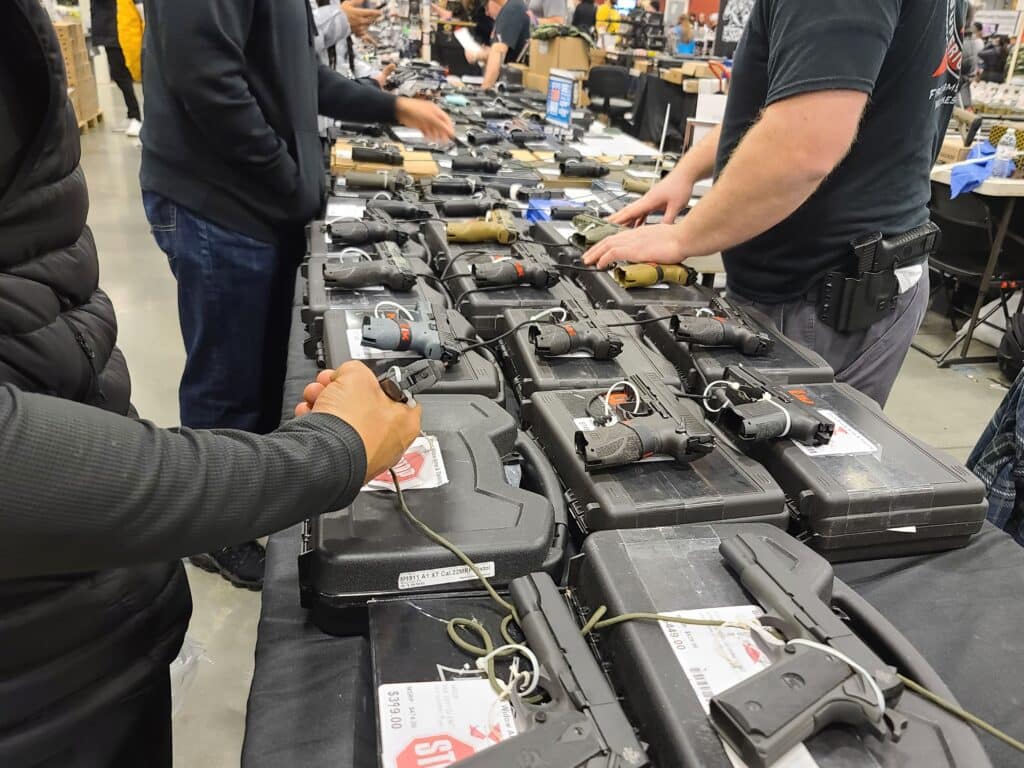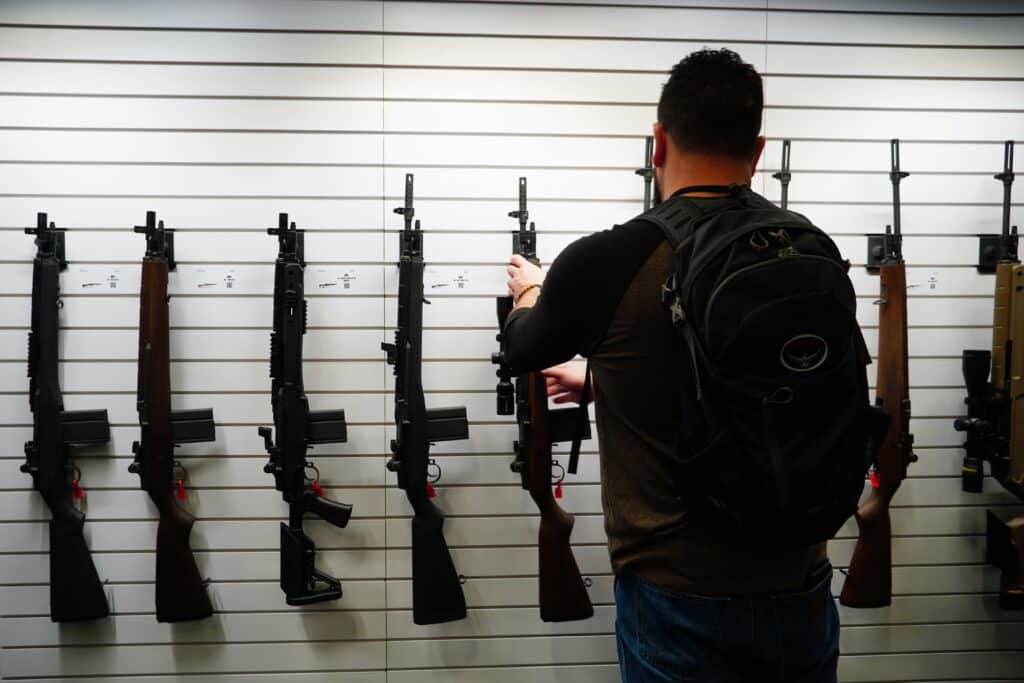We’ve talked a lot about how little the Supreme Court’s latest Second Amendment ruling has impacted lower court decisions thus far.
Since its decision in US v. Rahimi last year, the Court has granted, vacated, and remanded several cases, but all have come back with the same conclusion. That remains true. However, as Contributing Writer Jake Fogleman explains, Rahimi just had a major impact on a high-profile gun case in the Fifth Circuit.
Then, I explain what the confirmation hearing for Donald Trump’s Attorney General pick says about the power of the gun-rights movement headed into 2025. It’s not good news for advocates.
But GOP Congressman Richard Hudson joins the podcast to explain why he’s confident his pro-gun bill can make it through at least the House and maybe into law. He also answers a series of questions on that bill and the GOP’s overall gun policy strategy.

Analysis: Rahimi Makes an Impact [Member Exclusive]
By Jake Fogleman
The Supreme Court’s latest Second Amendment decision has been relatively impotent since the Court handed it down a few months back. But, this week, it inspired an appeals court to reverse a sweeping ruling against a federal firearms prohibition.
On Monday, a three-judge panel for the Fifth Circuit Court of Appeals unanimously upheld 18 U.S.C. § 922(n), a federal provision barring those under felony indictment from obtaining new firearms. The panel reversed a decision handed down shortly after 2022’s New York State Rifle and Pistol Association v. Bruen. It concluded, largely thanks to the Supreme Court’s subsequent guidance in US v. Rahimi, that restricting the acquisition of guns by those under indictment comports with the “principles that underpin” the nation’s historical tradition of firearms regulation.
“[W]e hold that the government has met its burden of showing that § 922(n) is relevantly similar to pretrial detention at the founding,” Judge Priscilla Richman wrote in US v. Quiroz. “This modern regulation ‘fits neatly’ within our nation’s historical tradition of protecting the public from criminal defendants indicted for serious offenses.”
The decision officially reverses the country’s first-ever ruling striking down the felony indictment gun ban. In September 2022, US District Judge David Counts ruled the prohibition was facially unconstitutional under the Second Amendment. He also dismissed a follow-on charge for making a false statement while purchasing a firearm that hinged on the felony indictment gun ban’s validity.
“This Court is skeptical that the Government here, or in any other court, could defend § 922(n) ‘s constitutionality,” he wrote at the time.
By contrast, Richman’s ruling on Monday emphasized the extent to which the Supreme Court had refined the legal standard Counts relied on when making his decision.
“While Bruen serves as an important guidepost, the Supreme Court’s recent decision in United States v. Rahimi further informs our analysis,” she wrote.
More specifically, she drew attention to Rahimi‘s focus on more general “principles” for analogical support over “historical twins” and its assurance that the law is not “trapped in amber.” She reasoned that those assurances provided greater coverage for modern laws to pass Second Amendment muster, so long as “why and how” a modern regulation burdens a citizen’s gun rights is comparable to past practices.
“Although the government here does not identify a historical law that specifically prevented acquisition of firearms by those under indictment, this lack of a historical twin is not dispositive to our inquiry into the constitutionality of § 922(n),” Richman wrote.
She noted that, since the Founding, the government has disarmed suspected criminals by holding them in jail until they face trial, which “resulted in the complete deprivation of the criminal defendant’s liberty and ipso facto restricted their access to weapons.”
She also argued that Founding-era criminal defendants were often denied bail or otherwise held in jail as a public safety measure, much in the same way Congress sought to protect the public from violent indictees when it passed § 922(n).
“We therefore conclude that the modern purpose of § 922(n) is relevantly similar to the historical purpose of pretrial detention,” Richman wrote.
As for how a person’s gun rights are burdened under each system, Richman again viewed the comparison favorably, noting that both Founding-era pretrial detention regimes as well as § 922(n) are both “temporary restrictions” on constitutional rights that last only while a suspected offender awaits trial.
“Just as § 922(n) restricts the ability of those under indictment to receive new weapons, pretrial detention ‘naturally entail[ed] the loss of a wide range of liberties—including the loss of access to weapons,'” she wrote. “In fact, because § 922(n) restricts only shipping, transporting, and receiving firearms, whereas pretrial detention denied the mere possession of firearms, it could be said that § 922(n) places a lesser burden on Second Amendment rights.”
Finally, the panel rejected the defendant’s argument that many Founding-Era suspects were allowed bail and, thus, not prevented from accessing firearms in the same way § 922(n) automatically requires. Quiroz, who was initially under indictment for burglary when he attempted to purchase a gun, identified six separate states at the time of the Second Amendment’s ratification that allowed bail for burglary suspects. The panel instead identified five states of its own that, at the time, denied bail to burglary defendants. It wrote off the discrepancy as irrelevant by again invoking Rahimi.
“Our historical analysis does not require unanimity in every instance,” Richman wrote. “As the Court explained in Rahimi, ‘[a] court must ascertain whether the new law is relevantly similar to laws that our tradition is understood to permit.'”
To be sure, Rahimi’s impact was not necessarily dispositive. After all, most courts evaluating the felony indictment gun ban post-Bruen and pre-Rahimi reached the same result. Still, the panel’s ruling cites Rahimi nearly as many times as there are pages in its opinion.
Its analytical logic may also embody one of the concerns Justice Clarence Thomas raised in his Rahimi dissent.
“Given that imprisonment (which involved disarmament) existed at the founding, the Government can always satisfy this newly minted comparable-burden requirement,” Thomas argued. “That means the Government need only find a historical law with a comparable justification to validate modern disarmament regimes.”
As a result, a panel from a circuit known for going much farther than its peers in hewing to a strict interpretation of the Bruen test has now okayed a modern gun law based on loose principles related to detaining suspected criminals at the time of the Founding. That’s certainly more impact than Rahimi has had in the majority of cases handled by courts specifically directed to give it greater weight by the Supreme Court.
Podcast: The GOP’s 2025 Gun Plans (Ft. Rep. Richard Hudson) [Member Early Access]
By Stephen Gutowski
This week, we’re looking ahead at what Republicans want to do on gun policy headed into their new trifecta.
To do that, we have the man who has been at the center of their legislative efforts for years now. Representative Richard Hudson from North Carolina’s Ninth District joins the show. He has sponsored most of the top-priority gun bills in recent years and just introduced a new version of national gun-carry reciprocity this year.
Rep. Hudson answers a series of questions on the details of the new bill and why he and his GOP colleagues decided to incorporate them. He also explains how he thinks it could get to President Donald Trump’s desk, even though he admits that’s a tall task. Then, he discusses other changes beyond the top-ticket items he and his colleagues plan to pursue.
Hudson also said he would not back new gun restrictions regardless of who pressures him, including the biggest players in his own party.
You can listen to the show on your favorite podcasting app or by clicking here. Video of the episode is available on our YouTube channel. An auto-generated transcript is here. Reload Members get access on Sunday, as always. Everyone else can listen on Monday.
Plus, Contributing Writer Jake Fogleman and I recap the first confirmation hearing for Donald Trump’s Attorney General nominee, Pam Bondi. We talk about why it could spell trouble for the political influence of gun-rights advocates. We also cover the Supreme Court’s latest rejection of multiple Second Amendment appeals and where things stand with a closely-watched pending ‘assault weapon’ ban case. Finally, we wrap up with discussions around the Third Circuit’s re-vindication of the carry rights of young adults in Pennsylvania, a guest post on the questionable state of firearms forensics, and a collection of key gun stories from outside The Reload.
Come on the Podcast
One of the perks of being a Reload Member is that you have the opportunity to appear on the podcast! I love doing these segments where we get to know our membership a bit better. It turns out there are a lot of smart and interesting folks who’ve signed on to make The Reload possible. I’d love to hear from more of you!
The member segment usually takes about 10 to 15 minutes. We can record from anywhere, and you just need some basic stuff like a webcam and microphone. Simply reply to this email or reach out to me directly to let me know you’re interested!

Analysis: Why Trump AG’s Confirmation Hearing is Bad News for Gun-Rights Activists [Member Exclusive]
By Stephen Gutowski
Anytime a politician begins a sentence with “I am an advocate for the Second Amendment, but…” gun-rights advocates tend to turn a skeptical eye in their direction. That’s what Pam Bondi did during her confirmation hearing, but the context surrounding those comments may be a worse sign for the gun-rights movement as the president it backed is set to take office.
On Wednesday, Donald Trump’s Attorney General pick described herself as a Second Amendment advocate who would “enforce the laws of the land.” When asked about her support for new gun restrictions during her time as Florida’s AG, including backing age restrictions and helping craft a “red flag” law, she pointed to her experience responding to mass shootings as formative for her gun views. While she declined to endorse any particular gun-control proposal, her explanation of her beliefs sounded a lot more like what you’d expect from a modern Democrat than the next Republican AG.
More troubling for gun-rights activists than Bondi’s comments, though, may be who they were in response to. Instead of a grilling by skeptical Republicans looking for gun-rights assurances in exchange for their votes, the questions on Bondi’s gun record were posed by a California Democrat hoping she’d commit to publicly backing the policies she supported but on a national level.
Not a single Republican Senator asked Bondi about her background on guns or how she might handle the issue as AG.
That’s not because nobody wanted them to ask her those questions. Several prominent gun-rights groups have publicly criticized Bondi’s background since Trump announced her nomination.
Gun Owners of America declared Bondi had a “Second Amendment problem” ahead of the hearing. It cited her backing of a “red flag,” bump stock ban, and ban on commercial sales of guns to 18-to-20-year-olds as evidence. It said her record was “a mixed bag,” which is “simply not good enough.”
“That’s why it’s so important that we make sure that the Trump Department of Justice recognizes that gun ownership is a God-given right guaranteed by the Constitution and that gun owners are public safety partners for law enforcement—not a subset of Americans to be policed,” the group said in a message to supporters. “To do that, we need YOU to contact your Senators and urge them to demand answers from Pam Bondi so gun owners know exactly where she stands on the Second Amendment.”
The National Association for Gun Rights put out nine specific questions it wanted Republicans to ask her. None of the Republicans bothered.
The National Rifle Association (NRA) has remained silent on Bondi. It didn’t say anything before or after her confirmation hearing. The group has been in a state of flux as its legal troubles wind down and new leadership takes hold, and it hasn’t been very active in the lead-up to the new Trump Administration.
As Bondi’s hearing wrapped up without any pushback on her gun record, it became clear she’d sail through her confirmation vote. Even Democrats admitted as much. That’s a bad sign for the political potency of the gun-rights movement.
Bondi’s tenure as AG could have a substantial impact on gun policy. During her time as Florida AG, she consistently butted heads with gun-rights advocates, including the NRA, over her avid defense of the state’s gun restrictions. She could do the same in a national role.
She’ll also have a significant say over who becomes the next ATF Director. That’s a position gun-rights advocates want to see filled by somebody who pushes the agency away from its recent focus on strictly regulating the gun industry or outlawing certain firearms and accessories. Bondi may not have exactly the same priorities.
Undoubtedly, the ATF is likely to be less aggressive than under President Joe Biden and Director Steven Dettelbach. However, The New York Times reported last month that Bondi is pushing Trump to appoint “a relatively nonideological replacement for Mr. Dettelbach to fulfill the campaign’s law-and-order promises.” Whether Trump will listen to her, use the pick to reward a loyal supporter, or do something else entirely is anyone’s guess, but Bondi probably has a better shot than most at convincing him if she does become AG.
That Bondi’s background on firearms hasn’t sunk her nomination shouldn’t come as a major surprise either. After all, Trump has supported many of the same policies as Bondi. In fact, the comments where she most clearly backed temporary gun confiscation for those deemed a threat to themselves or others came during a post-Parkland meeting at the White House with Trump.
“I’ve had my solicitor general on it for three days now working on it,” she told Trump in 2018. “We’ve been rewriting it, and we’re going to bring in something called the gun violence restraining order.”
“Good,” Trump responded.
Trump took Bondi’s idea to heart and repeated her complaints about how long it takes to confiscate guns from people suspected of being dangerous under state law a few days later.
“I like taking the guns early, like in this crazy man’s case that just took place in Florida … to go to court would have taken a long time,” Trump said at a later meeting with lawmakers.
“Take the guns first, go through due process second,” he followed up.
Like Bondi, Trump also supported a bump stock ban during his first term. He ordered the ATF to unilaterally reclassify the devices as subject to the National Firearms Act, effectively outlawing them using a mechanism President Biden copied numerous times over the past four years.
None of this has hurt Trump politically. The gun voters have mostly stuck by his side, even during a primary that featured candidates with stronger gun records. While things like the bump stock ban or public comments flirting with “red flag” proposals anger some of the most engaged gun activists, there’s little evidence they sway the average gun voter–especially those who aren’t directly impacted by them.
Plus, when he was pitted against Kamala Harris, whose record even includes support for handgun confiscation, in the general election, gun-rights activists largely came home to Trump anyway.
Trump did make some efforts to court gun voters during the campaign, including speaking at two NRA events. But his promises were fairly mild, mainly consisting of rolling back Biden-era ATF rules, and the GOP stripped nearly all of the gun policy promises from its 2024 platform.
The gun-rights movement is more fractured than it was during Trump’s first term. The NRA is only now emerging from a six-year scandal, and its rivals have grown but not nearly to the extent they’ve shrunk. The movement has lost nearly all purchase with the Democratic Party in a push-pull cycle that’s lasted decades. So, even though Republicans are now back in control, they can’t credibly threaten much more than the idea of gun voters sitting out future elections. That’s not nothing, but it’ll probably require more recent real-world examples than those currently on the books.
The current dynamic leaves Trump and the Republican Party writ large in a position where they can more easily take gun voters for granted. While the potential for new gun control under Trump and a GOP-controlled Congress is underestimated, it still isn’t the most likely negative outcome for gun activists. Instead, as Bondi’s confirmation non-fight shows, the gun-rights movement is likely to find itself among the lower rungs of the current GOP coalition’s priority list. If other concerns that strike closer to Trump’s heart are involved, concerns of gun-rights activists will probably take a back seat.
It’s difficult to predict what Trump might do in his second term. His first term provides some insight. He’ll probably appoint pro-gun judges. He’ll probably sign pro-gun legislation–if any actually makes it to his desk. He might also implement new gun restrictions through executive action or appoint an ATF director gun-rights advocates don’t like.
Gun-rights groups may accept that trade-off as worth it. Or they may be able to mount more effective influence campaigns against Trump Administration moves they don’t like down the line, as they did in getting Republican Senators to sink Trump’s ATF pick in his first term.
For now, though, Trump isn’t prioritizing gun rights in pre-Innaguratoin moves, and Republicans followed his lead during the AG confirmation hearing.
That’s it for now.
I’ll talk to you all again soon.
Thanks,
Stephen Gutowski
Founder
The Reload







